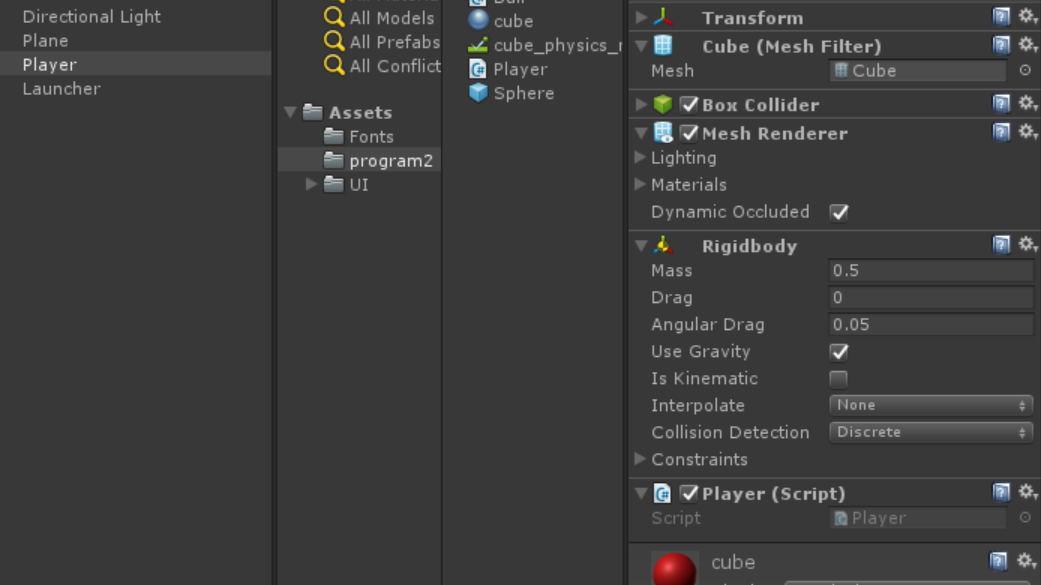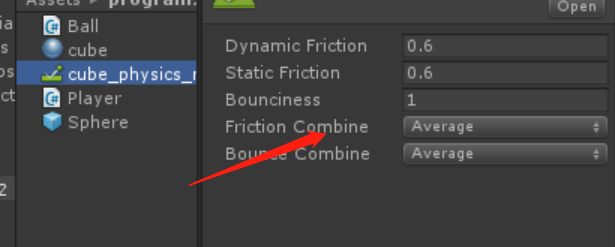1, 游戏入门的一些知识点,游戏对象GameObject(角色), 组件Compoent(角色的功能),资源Asset(美术素材呵呵音频等的数据),场景Scene(用以放置各个角色,负责展示画面),预制Prefab(事先做好的模型,游戏中代码生成)。
2,小demo。
脚本预览,Player.cs :用于控制小方块的运动。
Ball.cs:控制小球运动。
Launcher.cs:用于控制发射台和小球的发射。
注:观察unity标题栏,能发现在unity Personal(64bit)-Untitled ------这一文版右侧有“*”号,* 表示当前项目文件需要保存,保存之后该符号就会消失。之后做了操作之后需要重新保存的时候,符号会再次出现。
调整摄像机的角度,:按住Alt键的同时拖动鼠标左键,摄像机以地面为中心旋转。而若按住Alt键盘和Ctrl键(苹果是Command键)的同时拖动鼠标左键,摄像机平行移动。滚动鼠标滚轮,画面将向场景深处前后移动。
涉及的一个问题:unity在处理数字的时候,并未特别说明是按照米或者厘米为单位进行计算。不过在重力值设为9.8的时候,就意味着Rigibody组件是按照1.0=1米的尺寸模拟物理运动。
若游戏中玩家角色和小球的尺寸是1.0,那么就是直径为1米的庞然大物。而在现实世界中,人们会觉得大物体是缓慢落下的,也因此许多微缩电影摄影中,通过把高速摄影拍下的东西进行缓慢播放,就可以把某些小的细节放大。
此时,为了消除或者减缓这种慢悠悠落下的效果,可以采取的方法有两种,1,减小对象自身的尺寸,2增加重力值,增强重力后,物体对象下落的速度会变得很快。
Edit--> Project setting --> Physics ,在检视面板将Gravity项的Y 值首位提高一些,比如设置为-20。(注意:是负值)
栗子:


脚本:
public class Launcher : MonoBehaviour { public GameObject ballPrefab; void Start () { } void Update () { if (Input.GetMouseButtonDown(1)) { Instantiate(ballPrefab);//创建预制体ballPrefab } } void OnBecameInvisible() { Destroy(this.gameObject);//删除游戏对象 } }
public class Ball : MonoBehaviour { void Start () { this.GetComponent<Rigidbody>().velocity = new Vector3(-8.0f, 8.0f, 0.0f); } void Update () { } }
public class Player : MonoBehaviour { protected float jump_speed = 5.0f; private bool is_inland = true;//着陆标记 void Start () { } void Update() { if (this.is_inland) { if (Input.GetMouseButtonDown(0)) { this.is_inland = false; this.GetComponent<Rigidbody>().velocity = Vector3.up * this.jump_speed; //若玩家第一次起跳未结束就进行了第二次的鼠标左键点击,此时是会继续向上运动的,此时需要加入开关/标记 // Debug.Break();//暂停游戏运行,观看效果;此函数便于检测,游戏中速度等的很快的时候,不方便查看的时候 } } } void OnCollisionEnter(Collision collision) { //用于区分不同对象 if (collision.gameObject.tag == "Finish") { this.is_inland = true; } }
注:弹性材质:

注:可以利用最高点的高度计算得到起跳速度
public class Player : MonoBehaviour { protected float jump_height = 4.0f; private bool is_inland = true;//着陆标记 void Start () { } void Update() { if (this.is_inland) { if (Input.GetMouseButtonDown(0)) { this.is_inland = false; float y_speed=Mathf.Sqrt(2.0f*Mathf.Abs(Physics.gravity.y)*this.jump_height); this.GetComponent<Rigidbody>().velocity = Vector3.up *y_speed; }
}
}
利用的公式是v=根号下 2*g*h;